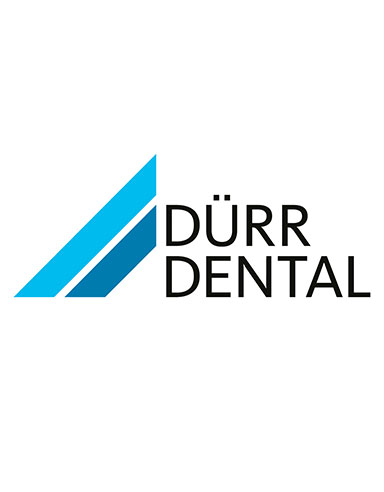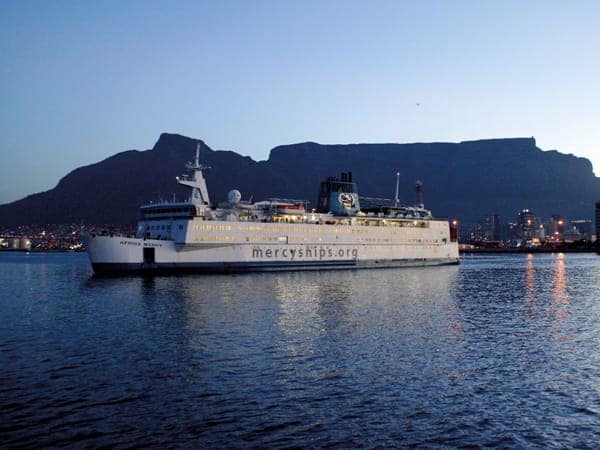During six years the Africa Mercy set sail to Benin, Togo, Sierra Leone and Guinea in order to provide several months of treatment to the poorest of the poor. Whereas treatment costs are funded with donations, volunteers must shoulder travel costs and their stay on board themselves – which includes oral and maxillofacial surgeons, ophthalmologists, dentists, and (dental) medical professionals.
This is one of the many reasons why Dürr Dental has been involved with the aid organisation for over ten years. It provides donations, but in particular equips the hospital ship’s dental clinics with medical technology. For the first time, D’life was able to speak with Dr. Gary Parker about the Africa Mercy and the organisation’s future plans.
D’life: After ten months in action in Congo your voluntary assistants have started on their return journey in June in Pointe Noire harbour. Which course did the ‚Africa Mercy’ set for and did you stay on board?
Dr. Parker: Normally each year we are required by international maritime regulations to go to a shipyard for repairs and inspections in drydock. This year was no acception. The ship sailed to the shipyard/drydock in Las Palmas, Gran Canaria. During this time, the hospital is closed so I use this opportunity to go home to the States to visit family and friends.
You are living on board of the ‚Africa Mercy’, with your wife and both your children? Are all three of them woven into the hospital ships’ work/duties?
Our oldest child is now attending university in the USA so, our second child, a boy is with Susan and I on board. He attends the on board school. Susan, who has her master’s degree in cross cultural education, is involved in this aspect of crew training, as well as doing special projects for the Managing director of the ship.
How much time remains for your family life and how can you spend your leisure time on a ship?
Dr. Parker: I do work long hours, but because the hospital is a one minute walk from my cabin, I am normally able to be home for meals together. And on the weekends when I am not on call, we can go off and explore the country in which we are serving. My children have had an unsusal upbringing, but they have a very good understanding of the needs and the beauty of Africa.
D’life: Do stress situations emerge if one lives with 400 crew members every day on board of a ship? How do you manage?
Indeed they do. Besides 400 crew members, they are from, on average, 35 or more different nations. So the opportunities to be misunderstood are plentiful. Sadly “common sense” is not common, and we have to work hard at not letting misunderstandings deteriorate into broken relationships between crewn members. It is a regular topic in our community gatherings. We need to help each other and support each other.
D’life: As Chief Medical Officer you are responsible for the medical/dental team amongst other things. How many employees work on the ‚Africa Mercy’ in average? And how big is the dental team?
On average the medical and dental team is made up of 150 volunteers. The dental team itself has about 20-25 people.
Which routine operations are part of a normal daily life of an medical specialist for oral and maxilofacial surgery? How often are moderate and heavy surgical procedures required? Which are the most frequent clinical images in those cases?
Surgeons on board operate at least five full days a week, and sometimes on weekends if a patient develops a complication requiring further surgery. For myself, and other Oral and Maxillofacial Surgeons, about one third of our operating time is with children and adults with congenital deformities like cleft lip and palate. Another third is resection and reconstruction for tumours of the maxilla, mandible, neck and head. And the final third those who require reconstruction after destruction of the face by Noma, or have total ankylosis of the Temporomandibular joints and require release and reconstruction of the joints.
This summer the hospital ship had a stay in the shipyard. Are the medical and dental facilities checked and poss. updated in such cases?
Yes this is the time when technicians from many different companies come to the ship and repair, service or update our equipment. We have hundreds of pieces of equipment from CT Scanners and Cone Beam Scanners down to surgical instruments which require sharpening and everything in between.
The work effort on the ‚Africa Mercy’ certainly is exhausting not only for the people but also for the medical technology. Do the devices have to display specific features of performance?
We are so grateful for the many individuals and medical technology companies who help us, sometimes for free, or at very discounted rates. This helps us make the money people donate to Mercy Ships go farther.
With the help of treatments, operations etc. you are bolstering the people up and give the patients back some quality of life. After treatment is necessary to preserve the results. Equally important are precaution and medical consultation. Do you have time therefore and do you have the possibilities to organize e.g. the after treatment?
One of my highest priorities is befriending and training African surgeons in the nations where we serve. I try and teach techniques which are sustainable in the sense that the national surgeon can do the operations with the resources available to him or her. Sometimes this is not possible, but I do my best. For example, in Congo Brazzaville, I worked two or three days a week for 10 months with one of the only two Oral and Maxillofacial surgeons in the country (population ~5m million).
We decrease the severity of operations in the month prior to the departure of the ship, to avoid leaving behind patients with serious complications. And the national surgeons I work with throughout the 10 month ship visit take care of the needed follow up.
Are there clinical images frequent to children/grown-ups in West Africa? Do the classical ‚diseases of civilization’ such as caries and parodontopathies act a part in their everyday life
Oral disease tops the list in the Global Burden of Human Disease Study*. More people worldwide suffer with dental disease than any other disease. And Africa is no exception to this. Dental caries and periodontal disease is wide spread through the nations in which the ship serves. And osteomylitis with loss of large portions of the maxilla and mandible is a major problem.
There is a spectrum of oral health stretching from dental esthetics and good dental health, to dental neglect and disease, and finally to dental death from sepsis or suffocation from major dental infections or tumors. Dental death is a major issue amongst the poor segments of African society, because dental care is either physically not available, or financially unaffordable.
One ship for many millions of people in West Africa – isn’t that like a drop in the ocean?
It is indeed. I find that I need to take one day at a time. Do all the good I can for the patients who come seeking help, and then move on to the next. If I think about the millions needing help, it is overwhelming. But for each one I am able to help, it makes a huge difference. You may have heard the proverb: “We cannot change the whole world. But we can change the whole world for one person, and then the next, and then the next.”
Recently released news stated that: a second hospital ship is under construction and will be available in 2017. Will the ship be a mirror image of the ‚Africa Mercy’ or will the range of treatment be extended?
The new ship will be slightly larger than the Africa Mercy, and will have increased surgical and educational capacity. We will be able to extend and expand the types and amounts of surgery we do. It is very exciting.
Which are your biggest hopes and worries at the moment concerning West Africa?
At this present time, the Ebola outbreak is my most pressing concern. This current outbreak in West Africa is unprecedented in size and dynamics. It is not possible to predict the outcome based on past outbreaks in Central Africa. We need a massive effort by the world community to help the men, women and children of West Africa. As well the people of the DRC will also need support as a new outbreak of Ebola is now reported there.
Is there special message or special wishes you would like to address to the editor of D’life or our readers in Germany? What can a D’life reader do if he or she wants to be active in the project?
Over my years in Africa working with Mercy Ships, I have seen over and over again how important it is for all of us to work together. The partnership between organizations like Dürr Dental and Mercy Ships is essential to see help come to some of the poorest people in our world today. These partnerships really do make a difference. I have see this with my own eyes for the past 27 years. I am very grateful for the generosity of Dürr Dental, and also for the interest in helping Africa by the employees of this great company.
If people would like to volunteer with Mercy Ships, the Mercy Ships website (» www.mercyships.org) will guide you to the local Mercy Ships office, where questions can be asked, and the process of coming to the ship begun.
Thank you for the interview, Dr. Parker!
* World Health Organization Study on global effects of illness, 2002

